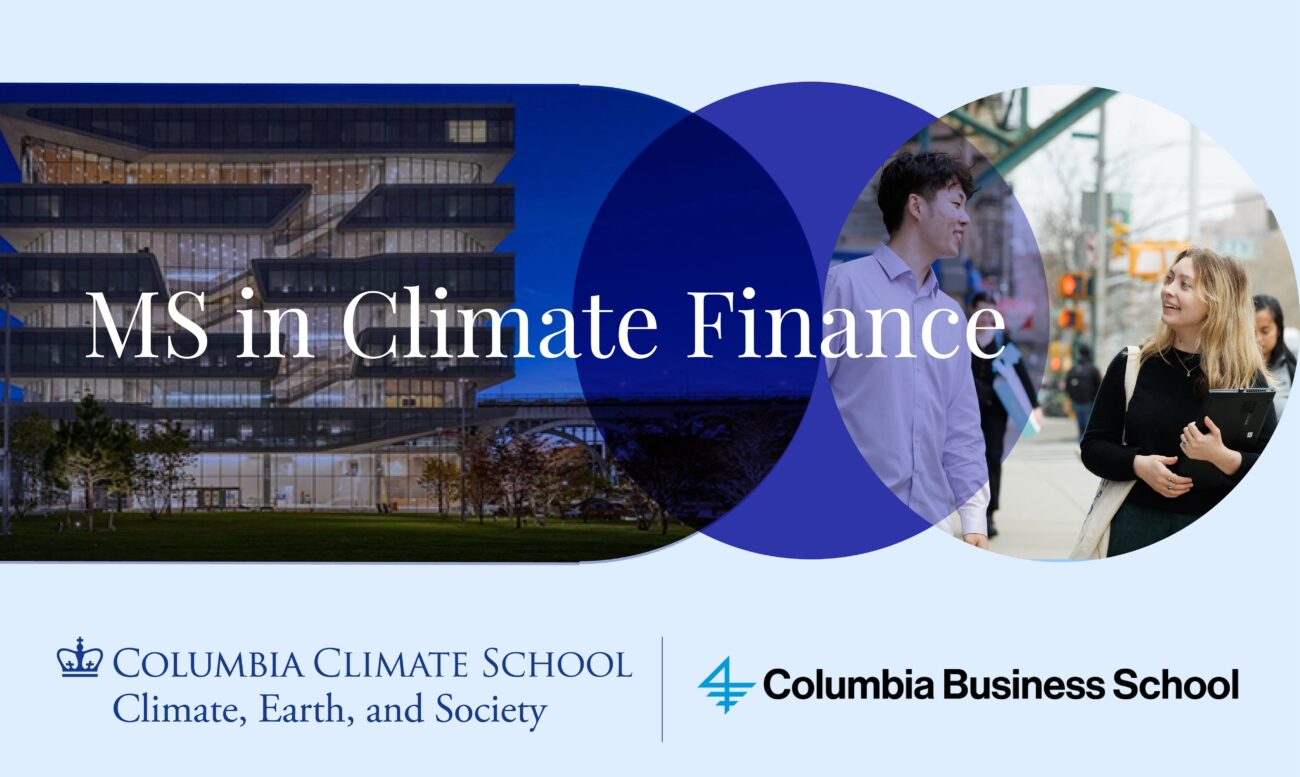The Columbia Climate School is excited to announce the first master’s degree program in the United States for climate finance. In close collaboration with the Columbia Business School, this interdisciplinary degree will drive impactful solutions to the climate crisis through advanced financial tools and scientific knowledge. This is the third master’s program announced by the Climate School, in addition to an M.A. in Climate and Society and an M.S. in Climate degree.
“The world needs problem-solvers to address the global climate crisis,” said Alexis Abramson, dean of the Columbia Climate School. “Everyone at the Climate School is committed to developing solutions, and bringing together fields like climate and finance as a multidisciplinary approach is pivotal, as we need all hands on deck to respond to this urgent global challenge.”
The M.S. in Climate Finance is a one-year degree combining courses in climate science, adaptation and mitigation strategies, international climate finance, capital markets, energy and infrastructure financing, and more. The first group of students will begin classes in fall 2025.
“By collaborating with the business school, we are able to provide students with not just a foundation in core climate science but also fundamental business acumen,” said Climate School senior vice dean Jeff Shaman. “It will equip students with the financial decision-making skills needed to respond to the climate crisis.”
“Climate change is going to impact every sector and all aspects of our lives,” said Costis Maglaras, dean of Columbia Business School. “Only by combining ideas from climate science and finance can we address these challenges.”
The new program meets a growing need in public and private financial institutions, as well as within multilateral organizations and the public sector, to assess risks and opportunities associated with climate change, and to identify pathways to mobilize critical finance.
“There is a real demand in business and finance for practitioners who understand climate variability, climate risk, the difference between mitigation and adaptation, and emerging investment opportunities,” said Lisa Sachs, director of the Columbia Center on Sustainable Investment, associate professor at the Climate School and director of the new Climate Finance program. “And there is a global demand for graduates who understand the challenges of climate finance and have the expertise to close the financing gaps.”

Graduates of the program will bring unique knowledge, skill sets and networks to solutions-oriented positions in the business sector, public and private financial institutions, development finance institutions, global climate-finance initiatives, ministries of finance and civil society.
All of these institutions need practitioners who understand the complex interactions of climate and finance, to navigate the evolving imperatives and expectations on the private sector to understand risks and contribute to solutions, and to lead impactful reforms and approaches to drive impact through public and international institutions.
“The program is designed to attract a diverse student body and individuals at different stages in their careers,” said Bruce Usher, a professor of professional practice at the Climate School and at the Columbia Business School. “The M.S. in Climate Finance degree will prepare graduates to use the latest climate knowledge and financial expertise to implement practical solutions to climate change globally.”
As part of the new climate finance degree, the Columbia Climate School will be offering Stanley Park Climate Finance scholarships to cultivate a new generation of professionals equipped to integrate expertise in climate and finance to address the climate crisis. The scholarships will be awarded through a competitive application process and are open to applicants with demonstrated financial need and an intention of contributing to the public and nonprofit sectors, and particularly those from countries with emerging and developing economies.
With New York City—the world’s leading financial hub and home of the United Nations—as backdrop for the program, students will regularly interface with preeminent practitioners from finance, industry, the public sector and global organizations.
“This degree combines the best of two extraordinary schools at Columbia University: the Climate School and the Business School,” said Sachs. “It’s critical to understand the implications and opportunities for public and private finance in responding to climate change, drawing on world-class faculty and leading experts in each discipline.”
Source link
Columbia Climate School news.climate.columbia.edu

